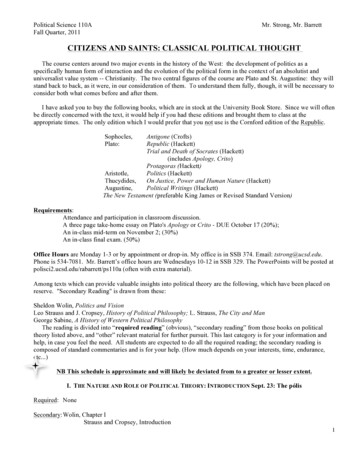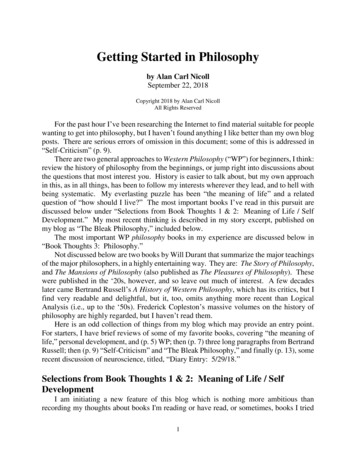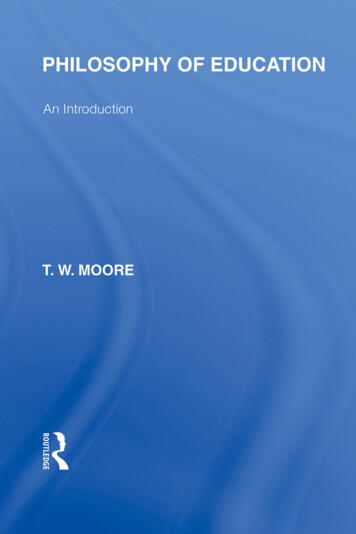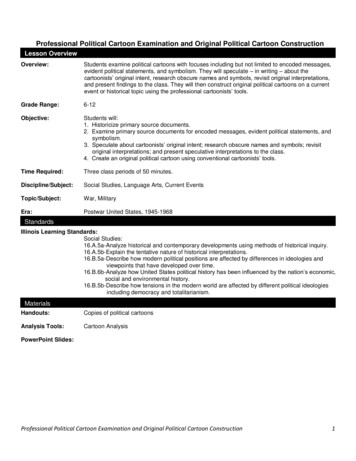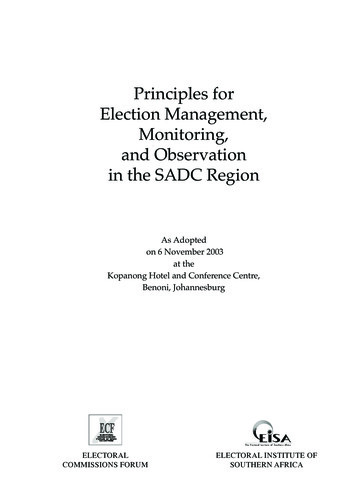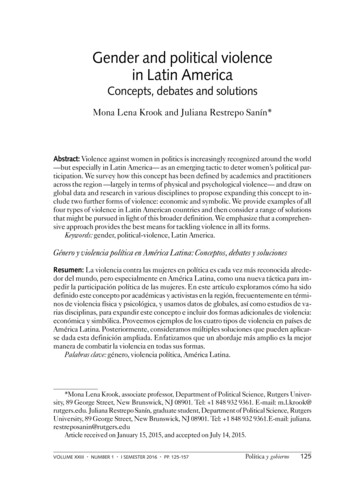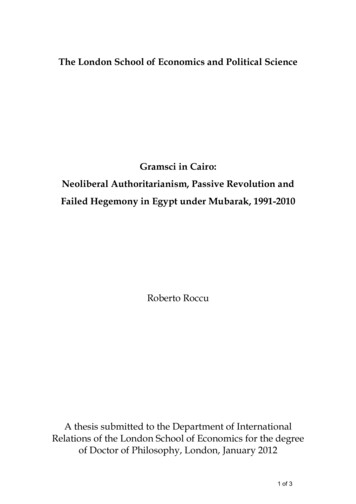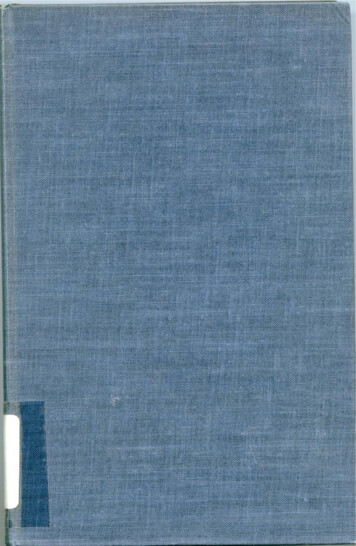
Transcription
The Political Philosophyof HobbesIts Basis and Its GenesisByLeo .Strauss.Translated from the German ManuscriptBy Elsa M. SinclairT HEUN I VERS I TYOFCH I CAGOPRESS
IITHE MO RAL BASIShphilosophy, as that branch of knowledge whicicspolitand,handconsists of moral philosophy on the oneed systematicallyin the narrower sense on the other,! was treatthe Elements ofinand exhaustively by Hobbes three times:the ElementaofLaw (164o), in the second and third partsIll, De cive,ionphilosophiae (Section II, De Mmine, 1658; Sectentationspresthree1642), and in the Leviathan (x6sx). In allrial onmateandodthis political philosophy is based in methmposie:Colutiv'resonatural sclen,ce. The method is Galileo'sanisticmechthefromtive' method. The material is borrowedn.eptio-percsenseofyexplanation of the passions and previouslhaswhooneyeverstIt is therefore understandable that almoical philosophywritten abou t Hobbes has interpreted his politrial or methodmateras dependent on natural science, for eitheglance seemsfirstaator for both. This interpretation, whichproves onfact,ousto be merely the recognition of an obvible.tionacloser examination to be extremely quesy as a part orThe attem pt to work out political philosophmethod istificscienofannexe of natural science by meanswas. awareheusebeca,constantly questioned in Hobbes's workn.t ee.etwof the; nda men tal di.fW:encts.hconvichisdbaseissenes and meth9d. On this awarent ofpendindetiallyessention that political philosophy isishpublandwritetoablenatural science. He was thereforetwotherebefosyearyDe cive, the third part of his system, manof the prematuresystematically earlier parts. In justificationthe preface ' . .insayspublication of this book, he expressly, tempore tamenesset)factum est ut quae ordine ultima (parspropriis expeipiisprincprio r prod ierit ; praesertim cum earnviderem'.2nonereindigsrientia cognitis innixam, praecedentibuOLITICALP,. \ded.De corpore, cap. 1, art. 9; De homine, Ep.e that what is said in theIt follows from the dedic ation to De homin holds also for the phy.part of political philo sophy , mora l philo12
THE MORAL BASIS7Political philosoQ.hy is independent of natural science becauseits pnnciples are not borrowed from natural science, are not,indeed, borrowed from any science, but are provided by experience, by\ the experience which every: one h imself,\or, toput it more accurately, are discovered by the efforts ol selfknowledge and the self-examination of every one. As a result,evidence in political philosophy is of quite a different kindfrom evidence in natural science. On the one hand, it is mucheasier to understand: its subject and its concepts are not soremote from the average man as are the subject and conceptsof mathematics which form the basis of natural science.2 Onthe other hand, 'the politiques are the harder study of thetwo'; by reason of their passions, men obscure the, in itself,clear and simple knowledge of the norms which political philosophy builds up. Moreover, man with his passions and his selfseeking is the particular subject of political philosophy, andman opposes by every kind of hypocrisy the self-knowledge onwhich the proof of these norms rests. 3According to Hobbes, political philosophy is not only independent of natural science, but it is a main component of humanknowledge, of which the other main component is naturalscience. The whole body of knowledge is divided into naturalscience on the one hand, and political philosophy on the other: Every classification of knowledge is based on a classification ofthe existent. 5 Hobbes's classification of the sciences is based ona classification of existing things into natural and artificial. 6But this classification does not fully correspond to his intention, for most things which are produced by art, in particular all machines, are the subject of natural science.' It isnot so much the artificially produced things that are basically1 De ccrpore, cap. 6, art. 7; Letrnzthon, Introduction. De homine, Ep. ded.; L ?Viatlum, ch. 31 (p. 197) and Conclusion (p. 385).s Leviathan, cb. 30 (pp. 180 and 187) and Introduction; Elements of Law,Ep. ded.; English Works, vol. vH, p. 399·4 The immediate source for this classification may well be MariusNizolius, De veris principiis et vera ratione philosophandi (Parma, ISS3),1ib. 3,capp. 3-4.s De cive, Ep. ded.6 De corpore, cap. 1, art. 9; De homine, Ep. ded.; Leviathan, Introduction.7 Dt corpore, cap. I, art. 7; Dt civt, Ep. ded.; Leviathan, Introductionand ch. 9·
THE MORAL BASIS8differe nt from all natural things as the produc tion, the humanactivity itself, i.e. man as an essentially produc tive being,especially as the being who by his art produc es from his ownnature the citizen or the State, who, by working on himself,makes himsel f into a citizen. In so far as man works on himself, influencing and changi ng his nature, so that he becomesa citizen, a part of that artificial being called the State, he isnot a natural being: 'Homo . non modo cor us natural e est1ut ita lo uar corpor is politi .i par.§.'sed etiarn civitatis iding differe nt from 'natura l causes'.2someth'Manne rs of men' areThe basic classification of existing things which in truth underlies Hobbe s's classification of the sciences is classification undernature on the one side, and under man as produc tive and activebeing on the other.3The questio n whethe r Hobbe s unders tood political philosophy as a part or annexe of natural science or as a fully independen t branch of knowledge, in other words, whethe r hispolitical philoso phy is intend ed to be naturalistic or anthro pological, thus bears not only on the method but above all onthe matter . The significance of the antithe sis betwee n natural istic and anthropological political philoso phy for the matterbecomes fully appare nt if one grasps that this antithesis is onlythe abstrac t form of a concre te antithe sis in the interpr etationof and judgem ent on human nature which extend s throug houtthe whole of Hobbe s's work. Hobbe s elimina ted the lattercontrad iction as little as the former.Hobbe s summe d up his theory of human nature as it underlies his political philoso phy in 'two most certain postulates ofhuman nature '. The first postula te is that of 'natura l appetit e',4'qua quisqu e rerum commu nium usum postula t sibi propriu m' .As a result of the scientific explanation, this appetit e is taken ashaving its roots in man's sensuousness, in his animal nature.Man is an animal like all other animals, as a percipi ent beingconstan tly exposed to manifold impressions which automatically call forth desires and aversions, so that his life, like that of De homine, Ep. ded.E1tglish WOrks, vol. iv, p. 445; cf. !AJiatha n, ch. 37 (p. 238).ch. 9; De corpore, cap. r, art. 9;l Elements of Law, Ep. ded.; Ltviatha n,ded.Ep.De cive,4 De cive, Ep. ded.2
THE MORAL BASIS9all other animals, is constant movement. T here is, however,one important diff;;:ence: the specific""'Cfifference between manand all other animals i reason. Thus man is much less at themercy of momentary sense-impressions, he can envisage thefuture much better than can animals; for this very reason he isnot like animals hungry only with the hunger of the moment,but also with future hunger, and thus he is the most predatory,the most cunning, the strongest, and most dangerous animal. 1Human appetite is thus not in itself different from animal appetite, but only by the fact that in the case of man appetite hasreason at its service. This view of human appetite, which atfirst sight seems to be the specifically Hobbian view, is, however, contradicted in Hobbes's writings by his repeated andemphatic statement tha human a etite is infinite in itsel andnot as a result of the in 1mte number o externa 1mpress10ns.zBut if this is the case, then human appetite is essentially distinguished from animal appetite in that the latter is nothingbut reaction to external impressions, and, therefore, the animaldesires only finite objects as such, while man spontaneouslydesires infinitely. There can be no doubt that only this latterview of human appetite corresponds to the intention of Hobbes'spolitical philosophy.The two conceptions of human appetite differ not only insubstance as mechanistic and vitalistic conceptions. They differalso in method. The mechanistic conception is based on themechanistic explanation of perception and therewith on thegeneral theory of motion; on the other hand, the apparentlyvitalistic conception is based not on any general scientifictheory, but on insight into human nature, deepened and substantiated by self-knowledge and self-examination. In spite oftheir opposed matter and methods, the two conceptions ofhuman appetite have, however-belo w the surface-somet hing1De homine, cap. 10, art. 3·Elements of .Law, Pt. I , ch. 7, § 7; Leviatha11, ch. 11 (p. ,.9); De homine,cap. 1 I, art. IS· In all three passages Hobbes bases the proposition that lifei e mechanistically on the assumption that appetite isan automatic consequence of perception, but also on the incompatibleassumption that ppetite is essentially spontaneous. On closer investigationit is seen that the mechanistic argument is not sufficient proof of the proposition, and that therefore the proposition itself cannot possibly owe the selfeYidence, which it has for Hobbes, to the mechanistic argument.2orur
THE MORAL BASISasin common, which allows us to characterize both of themnaturalistic.The cleares.t and most perfect expression for the naturalisticmanconception of huma n appetite is the proposition thatconandslydesires power and ever greater power, spontaneousumtinuously, in one jet of appetite, and not by reason of aerableinnummation of innumerable isolated desires caused byallisolated perceptions: ' . in the first place, I put for a generofdesireseinclination of all mankind, a perpetuall and restles 1thisBut.'power after power, that ceaseth only in Deathequiapparently perfectly clear proposition is fundamentallyocal.equivitselfisrvocal, for the boundless striving after powethatesalwaynotisHobbes continues: 'And the cause of this,yalreadhashethana man hopes for a more intensive delight,ratemodeawithattained to; or that he cannot be contentmeanspower: but because he cannot assure the power and theofsitionacquitheto live well, which he hath present, withoutwellasalrationbemore.' The striving after power may thusisas irrational. Only the irrational striving after power, whichtakenbetoisg,strivinalfound more frequently than the rationpoweras natural human appetite. For the rational striving afterreasonverythatforisrests on already rational reflection andalnot natural, i.e. not innate, not in existence prior to all externlnaturaonlyThetion.zmotivations, to all experience and educadeisite,appetalnaturstriving after power, and thus man'sandscribed by Hobbes as follows; 'men from their very birth,havewouldandcovet,naturally, scramble for everything they3dsall the world, if they could, to fear and obey them. ' It depenthethatptionperceonthuson impressions from without andnotchild 'desires' that particular thing which he sees andthatbutng;nothiknowsheanoth er thing, of whose existence'-that ,he 'woul d have all the world . to fear and obey (him)andnedawakewaswhichdesireon the occasion of a particulartheoverruleteabsolues''desirhecaused by e world - ;an not originIOlLeviatluzn, ch. 11 (p. 49).cap.For Hobbes's concept of 'natura l', see especially De cive,annot. I.J English Works, vol. vii, p. 73·1 I,art.2,
IITHE MORAL BASISceived, for animals who also perceive and desire do not aspireto absolute dominion. In the case of man, animal desire istaken up and transformed by a spontaneous infinite and absolute desire which arises out of the depths of man himself.We find a mor detailed definition of the irrational strivingafter power, the natural appetite of man as man, in the followingdifferentiation between irrational and therefore unpermissiblestriving after power, and rational and therefore permissiblestriving:'because there be some, that taking pleasure in contemplating theirown power in the acts of conquest, which they pursue farther thantheir security requires; if others, that otherwise would be glad tobe at ease within modest bounds, should not by invasion increasetheir power, they would not be able, long time, by standing only ontheir defence, to subsist. And by consequence, such augmentationof dominion over men, being necessary to a man's conservation, itought to be allowed him.' 1We here clearly see that rational permissible striving afterpower is in itself finite. The man guided by it would remain'within modest bounds', would 'be content with a moderatepower'. Only the unpermissible, irrational, lustful sttivingafter power is infinite. Now irrational striving after power,man's natural appetite, has its basis in the pleasure which mantakes in the consideration of his own power, i.e. in vanity. Theorigin of man's natural appetite is, therefore, not perception butvanity.In four different arguments, Hobbes does not tire of designating the characteristic difference between man and animalas the striving after honour and positions of honour, afterprecedence over others and recognition of this precedence byothers, ambition, pride, and the passion for fame. z Becauseman's natural appetite is nothing other than a striving afterprecedence over others and recognition of this precedence byothers, the particularities of natural appetite, the passions, arenothing other than particular ways of striving after precedenceand recognition: 'all joy and grief of mind (consists) in a1Leui .Jum, ch. 13 (p. 64). Elnnents of Law, Pt. I , ch. 19, § 5; De cive, cap. 5, art. 5; Leviathan,ch. 17 (pp. 88- J).I'.
THE MORAL BASIScontention for precedence to them with whom theY. comsarethemselves.'I And as 'to have stronger, and moie vio entPassions for anything, than is ordinarily seen in others, is thatwhich men call Madnesse', madness must show with particularclearness the nature of the passions. Speaking of the cause ofmadness, Hobbes says: 'The Passion, whose violence, or continuance maketh Madnesse, is either great vaine-glory; whichis commonly called Pride, and selfe-conceipt; or great Dejectionof mind. z All passions and all forms of madness are modificationsof conceit or of a sense of inferiority, or in principle, of thestriving after precedence and recognition of that precedence.According to Hobbes's view, the motive of this striving isman's wish to take pleasure in himself by considering his ownsuperiority, his owa recognized superiority, i.e. vanity. 3The same conclusion is reached if one analyses and comparesthe arguments by which Hobbes in the three presentations ofhis political philosophy proves his assertion that the war ofevery one against every one arises of necessity from man's verynature. Every man is for that very reason the enemy of everyother man, because each desires to surpass every other andthereby offends every other. The astonishing discrepanciesbetween the three presentations, the still more astonishing obscurities, even the logical defects of the individual presentationsshow that Hobbes himself never completed the proofs of hisfundamental assertion, and, as is seen on closer study, did notcomplete them simply because he could not make up his mindexplicitly to take as his point of departure the reduction ofman's natural appetite to vanity. We cannot here produce theproofs for this assertion.4 Instead we would remind the readerof one fact, which, although it is so obvious, has, so far as weknow, always been overlooked-the reason which caused Hobbesto call his most detailed exposition of political philosophy the121 Elemmts of Law, Pt. II, ch. 8, § 3; cf. Elmrmts, Pt. I, ch. 8, § 8, andch. 9; also De cive, cap. I, art. 2.3 Leviathan, ch. 8 (p. 36); cf. Elements, Pt. I , ch. 10, §§ 9-11.3 'Gloria . . . ·s ive bene opinari de se ipso . .' De cive, cap. 1, art. 2;cf. Elements, Pt. I, ch. 9, § I; De cive, cap. 4, art. 9; De homine, cap. 12,art. 6. Cf. pp. 133 and I3S. note I, below.4 The author hopes to present these proofs in the near future within theframework of an exposition of Hobbes's political philosophy.
THE MORAL BASIS13Leviathan. At the end of the most important part of this work,he says:'Hitherto I have set forth the nature of Man, (whose Pride andother passions have compelled him to submit himseUe to Government;) together with the great Power of his Governour, whom Icompared to Leviathan, taking that comparison out of the last twoverses of the one and fortieth of Job; where God having set forththe great power of Leviathan, called him King of the Proud.''It is not mighty power as such which is the tertium comparationis between Leviathan and the State, but the mighty powerwhich subdues the proud. The State is compared to Leviathan ,because it and it especially is the 'King of all the children ofpride'. Only the State is capable of keeping pride down in thelong run, indeed it has no other raison d'etre except that man'snatural appetite is pride, ambition, and vanity. It is with thisthought in mind that Hobbes says of his book Leviathan thatit is 'Justitiae mensura, atque ambitionis elenchus'. 2Why could Hobbes not make up his mind to treat the viewwhich is in reality conclusive for him, that man's natural appetiteis vanity, unequivocally as the basis of his political philosoph y?If this conception of natw-al appetite is right, if man by naturefinds his pleasure in triumphin g over all others, then man isby nature evil. But he did not dare to uphold this consequen ceor assumption of his theory. For this reason, in the enumeration of the causes which lead to the war of every man againstevery man, in the final presentati on (in the Leviathan) he putsvanity at the end. 3 That it was the above-me ntioned reason which determined H obbes may be seen from a passage in thepreface to De cive. The objection had been raised that, according to Hobbes's theory, man is by nature evil. He replies:'Quarnquam . a natura, hoc est, ab ipsa nativitate, ex eo quodnascantur, animalia hoc habeant, ut statim omnia quae sibi placent,cupiant faciantque quantum possunt, ut quae impendent mala, autmetu fugiant, aut ira repellant, non tamen ob earn causarn mala1Lroiatha11, ch. 28, in ji11e." Opera /ati11a, vo l. i, p. xciv.Compare the different order of the argument in Leviathan, ch. 13(pp. 63-4) on the one hand, in Elements, Pt. J, ch. 14, §§ 3- 5 and Dt citJe,cap. I, art. 4 on the other. Cf. p. 169, note 2 , below. Cf. p. 33, I. 23.3
THE MORAL BASISISin his description of the striving after power itself, that theinnocence, neutrality, and moral indifference of that striving isonly apparent. The striving after power, as human strivingafter power, is always either good and permissible or evil andunpermissible. The apparent moral indifference arises simplyand solely through abstraction of the necessary moral difference, which Hobbes himself immediately stresses. Hobbes'spolitical philosophy rests not on th illusion of an amoralmorality, but on a new morality, or, to speak according toHobbes's intention, on a new grounding of the one eternalmorality.The second of the 'two most certain postulates of humannature' which Hobbes takes as basis of his political philosophy,along with the 'postulate of natural apEetite', is 'the postulateof ral reason', 'qua quisque mortem v en tanquamsummum naturae malum studet evitare'. In accordance withnaturalistic reasoning this postulate is reduced to the principleof self-preservation: since the preservation of life is the condition sine qua non for the satisfaction of any appetite, it is 'theprimary good' .1 As a logical conclusion of this thought, Hobbesattempts to deduce natural right, natural law, and all thevirtues-the four Platonic cardinal virtues-from the principleof self-preservation.2It is striking that Hobbes prefers the negative expression'avoiding death' to the positive expression 'preserving life'. Itis not difficult to discover the reason. That preservation of lifeis the primary good is affirmed by reason and by reason only.On the other hand, that death is the primary evil is affirmed bypassion, the passion of fear of death. And as reason itself ispowerless, man would not be minded to think of the preservation of life as the primary and most urgent good, if the passionof fear of death did not compel him to do so.3 A furtherreason, which is closely connected with the one already mentioned, recommends the negative expression. According toHobbes, the preservation of life is the primary good, anIarises from vanity is said by Hobbes in Elements, Pt. I, ch. x6, § to, andch. 9. § 6.1De homine, cap. u, art. 6. See particularly De cive, cap. 3, art. 32.3Cf. Elements, Pt. I, ch. 14, § 6 with the Ep. ded. to this work.
THE MORAL BASISunhind ered progress to ever further goals, a 'continuall prospe ring'-i n a word, happiness is the greatest good, but there is nosupreme good, in the sense of a good in the enjoyment of which1the spirit might find repose. On the other hand, death is theprimary as well as the greatest and supreme evil. z For death isnot only the negation of the primar y good, but is therewiththe negation of all goods, including the greatest good; and atthe same time, death- being the summum malum, while there isno summum bonum -is the only absolute standa rd by referenceto which man may coherently order his life. While in the orderof goods there is no real limit, and while, in addition, theprimar y and the greatest good are completely different, theprimar y and greatest and supreme evil are one and the same,and it is thus only in consideration of evil that a limit todesiring, a coherent orientation of human life, is possible. Onlythroug h death has man an ajm, because only throug h deathhas he one compelling aim-th e aim which is forced upon himby the sight of death the aim of avoiding dea.th. For thisreason Hobbe s prefers the negative expression 'avoidingdeath' to the positive expression 'preserving life': because wefeel death and not life; because we fear death immediately anddirectly, while we desire life only because rational reflectiontells us that it is the conditi on of our happiness; because wefear death infinitely more than we desire life.But Hobbe s cannot after all acquiesce in the assertion thatdeath is the primar y and greatest and suprem e evil. For heknows that a miserable torture d life can be a greater evil thandeath. Thus it is not death in itself which is the greatest andsupreme evil, but an agonizing death or, what seems at first to3mean the same thing, a violent death. But if Hobbes hadsupreme and greatesttheasdeathingreally considered an agonizimportance togreaterevenantedevil, he would have attribuis so little theThissa.Spinozormedicine than did Descartes 16n, ch. 6' De homine, cap. 11 , art. rs; Elements, Pt. I, ch. 7, § 7; Leviatha(p. Jo) and 11 in princ.r, art. 7· De hontine, cap. 11, art. 6; De cive, Ep. ded. and cap.3 De homitU!, cap. 11, art. 6; cf. Elements, Pt. I, ch. 14, § 6; De cive, Ep.ded.; ibid., cap. J, art. 12 and cap. 6, art. 13.4 Discours de Ia methode, in fine.s Tractatus de inttllectus emendatione, ed. Bruder, § 15.
THE MORAL BASIS17case that he actually forgets medicine: 'Calamitates autemomnes, quae humana industria evitari possunt a bello oriuntur,praecipue vero a bello civili; hinc enim caedes, solitudo, inopiaque rerum omnium derivatur.' 1 Not an agonizing death initself, but a violent death which threatens a man at the hand ofother men, is the only one which Hobbes considers worthy ofmention. When he says of an agonizing death that it is thegreatest evil, he thinks exclusively of violent death at the handof other men. The 'postulate of natural reason' expresses thisthought in the formula '(unusquisque) mortem violentam tanquam summum naturae malum studet evitare'.Not the rational and therefore always uncertain1 knowledgethat death is the greatest and supreme evil, but the fear of death,i.e. the emotional and inevitable, and therefore necessary andcertain, aversion from death is the origin of law and the State.lThis fear is a mutual fear, i.e. it is the fear each man has ofevery other man as his Eotential murdereJ:;. 4 This fear of aVIolent death, pre-rationai in its origin, but rational in its effect,and not the rational principle of self-preservation, is, according1De corpore, cap. I, art. 7· It must further be pointed out that in almostall the passages in which Hobbes treats of the utility of natural science, hedoes not mention medicine at all. Compare the following passages: Elements,Pt. I , ch. 13, § 3; De cive, Ep. ded. and cap. 17, art. 12; Leviathan, ch. IJ(pp. 64-5) and ch. 46 in princ.; De corpore, cap. x, art. 7. Speaking of the laws of natUie, Hobbes says: '(the dictates of reason)are but theorems, tending to peace, and those uncertain, as being but conclusions of particular men, and therefore not properly la"'-s.' English Works,vol. iv, p. 285. Cf. De cive, cap. 2, art. I, annot., and Leviathan, ch. 26(p. 14J).3 'Fertur enim unusquisque ad appetitum ejus quod sibi bonum, et adfugam ejus quod sibi malum est, maxime autem maximi malorum natUialium,quae est mors; idque necessitate quadam naturae non minore, quam quafertur lapis deorsum. Non igitur absurdum neque reprehendendum, nequecontra rectam rationem est,si quis omnem operam det, uta morte et doloribusproprium corpus et membra defendat conservetque. . . . ltaque JurisnaturaJis fundamentum primum est, ut quisque vitam et membra suaquantum potest tueatur.' De cive, cap. I, art. 7· That necessitas is not hereto be understood in the naturalistic-determinist sense is shown by parallelpassages, such as the following: 'You that make it so heinous a crime fora man to save himself from violent death, by a forced submission to a usUiper,should have considered what crime it was to submit voluntarily to theusurping Parliament . . . he (Hobbes) justified their submission by theirformer obedience, and present necessity . .' English Works, vol. iv, pp.423 fl. De cive, cap. I , art. 2-3.-
THE MORAL BASISto Hobbes, the root of all right and therewith of all morality.He drew all his logical conclusions from this : he finally deniedthe moral value of all virtues which do not contribute to themaking of the State, to consolidating peace, to protectingman against the danger of violent death, or, more exactly expressed, of all virtues which do not proceed from fear of violentdeath: 'Sunt enim tum fortitudo , tum prudentia, vis animipotius quam bonitas morum ; et temperantia privatio potiusvitiorum quae oriuntu r ab ingeniis cupidis . . quam virtusmoralis.' 1The antithesis from which Hobbe s's political philosophystarts is thus the antithesis between vanity as the root of naturalappetite on the one hand, and on the other, fear of violentdeath as the passion which brings man to reason. More accurately expressed: because Hobbe s reduces man's natural appetite to vanity, he cannot but recognize the fear of a violentdeath- not the fear of a painful death, and certainly not thestriving after self-pr eserva tion-as the principle of morality.For if man's natural appetite is vanity, this means that manby nature strives to surpass all his fellows and to have hissuperiority recognized by all others, in order that he may takepleasure in himself; that he naturally wishes the whole worldto fear and obey him. The ever-greater triump h over others this, and not the ever-increasin , but rationally increasing,. Ow er-is the aim and happiness of natural man: 'Continuallyto out-go the next before, is felicity.' Man's life may be compared to a race : 'but this race we must suppose to have noother goal, nor other garland, but being foremost.'z Absorbedin the race after the happiness of triump h, man cannot bestill' De homine, cap. IJ, art. 9· In De cive, cap. 3, art. 32, Hobbes had(p. 81),recognized the Platonic cardinal virtues; in the Leviathan, ch. ISpointedhe mention s only tempera nce besides justice. It must further t that in the Leviathaon isand that as early as the Elements (Pt. I, ch. I?, § I4) a clear distinctie, which aredrawn between justice, equity, gratitud e, tempera nce, prudenc, &c.,always virtues, on the one hand, and on the other, courage, hich can be virtues, desCf. Voltaire, Dictionnaire philosophique, art. 'Vertu' and 'Faussetsic ofvertus humaine s,' and Kant, Fundamental Principles of the orals, Elements, Pt. I, ch. 9, § 21.
THE MORAL BASISbecomes the master. The vanquished, who 'submittet h . forfear of death', who admits his weakness and with that hasforfeited his honour, becomes the servant.1 The dominion ofthe master over the servant-d espotic rule-is one form of thenatural State ;2 and as the other form of the natural State,patriarchy, is construed by Hobbes entirely according to thepattern of despotic rule, we may even say: despotic rule is thenatural State.The artificial State, which is as such more perfect, ariseswhen the two opponents are both seized with fear for theirlives,3 overcome their vanity and shame of confessing theirfear, and recognize as their real enemy not the rival, but 'thatterrible enemy of nature, death', 4 who, as their common enemy,forces them to mutual understan ding, trust, and union, andthus procures them the possibility of completing the foundingof the State for the purpose of providing safeguards for thelongest possible term, against the common enemy. And whilein the unforeseen life-and-death struggle, in which vanity comesto grief, the futility of vanity is shown, it is revealed in theconcord of living, and of living in common, to which
political philosophy is intended to be naturalistic or anthro pological, thus bears not only on the method but above all on the matter. The significance of the antithesis between natural istic and anthropological political philosophy for the matter becomes
